Report on Functional Areas and Employee Skills for Business Growth
VerifiedAdded on 2023/06/18
|8
|1952
|454
Report
AI Summary
This report provides an overview of the key functional areas within a business organization, including management, operations, accounting, marketing, and finance. It highlights the importance of understanding these areas for both business owners and employees. The report also identifies essential skills needed by employees to work effectively in these different functional areas, such as communication, time management, collaboration, IT proficiency, and goal-oriented thinking. It emphasizes the need for companies to appoint specialists in each area to achieve organizational goals and objectives effectively. Desklib provides access to this and other solved assignments for students.

Individual report
Paraphrase This Document
Need a fresh take? Get an instant paraphrase of this document with our AI Paraphraser
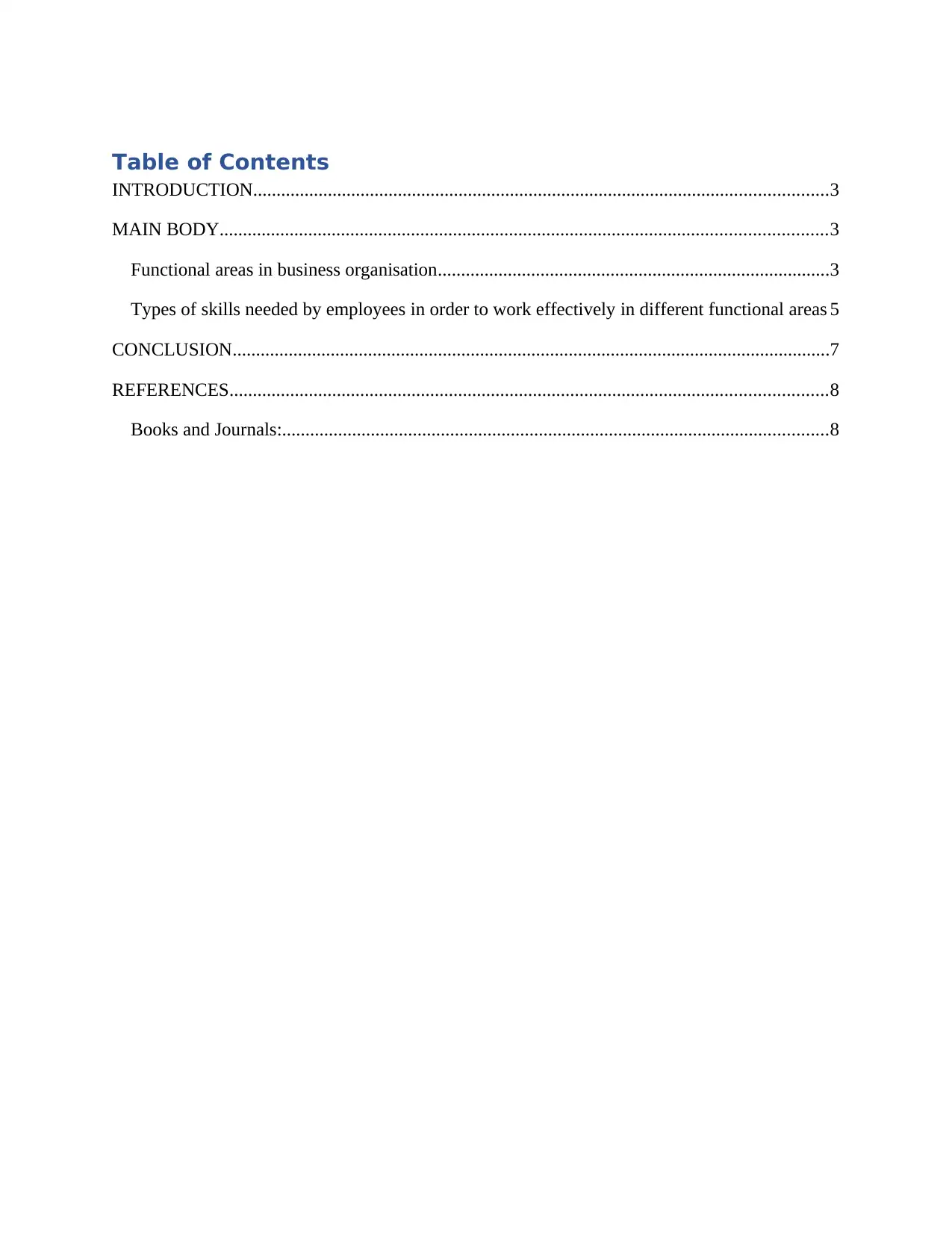
Table of Contents
INTRODUCTION...........................................................................................................................3
MAIN BODY..................................................................................................................................3
Functional areas in business organisation....................................................................................3
Types of skills needed by employees in order to work effectively in different functional areas 5
CONCLUSION................................................................................................................................7
REFERENCES................................................................................................................................8
Books and Journals:.....................................................................................................................8
INTRODUCTION...........................................................................................................................3
MAIN BODY..................................................................................................................................3
Functional areas in business organisation....................................................................................3
Types of skills needed by employees in order to work effectively in different functional areas 5
CONCLUSION................................................................................................................................7
REFERENCES................................................................................................................................8
Books and Journals:.....................................................................................................................8
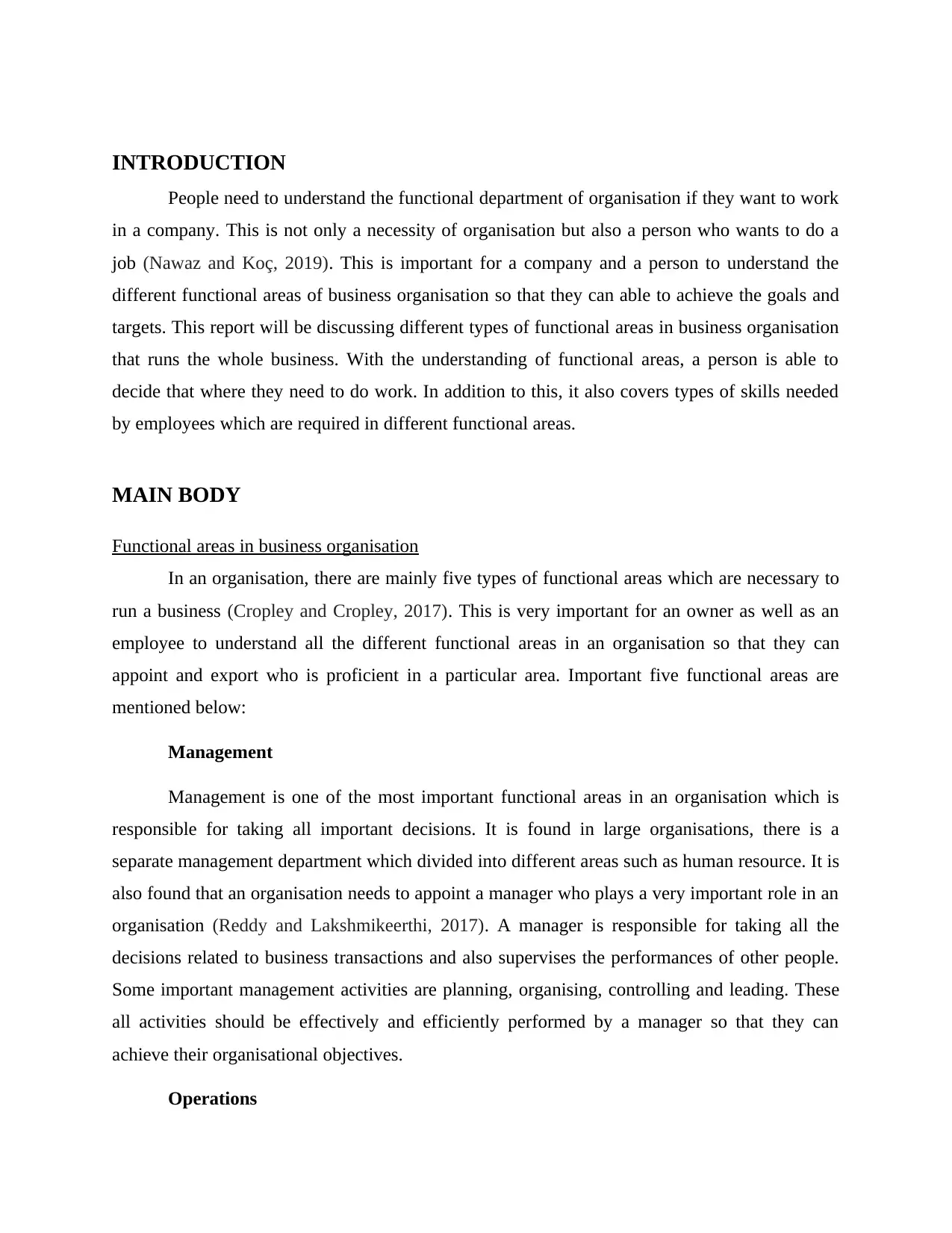
INTRODUCTION
People need to understand the functional department of organisation if they want to work
in a company. This is not only a necessity of organisation but also a person who wants to do a
job (Nawaz and Koç, 2019). This is important for a company and a person to understand the
different functional areas of business organisation so that they can able to achieve the goals and
targets. This report will be discussing different types of functional areas in business organisation
that runs the whole business. With the understanding of functional areas, a person is able to
decide that where they need to do work. In addition to this, it also covers types of skills needed
by employees which are required in different functional areas.
MAIN BODY
Functional areas in business organisation
In an organisation, there are mainly five types of functional areas which are necessary to
run a business (Cropley and Cropley, 2017). This is very important for an owner as well as an
employee to understand all the different functional areas in an organisation so that they can
appoint and export who is proficient in a particular area. Important five functional areas are
mentioned below:
Management
Management is one of the most important functional areas in an organisation which is
responsible for taking all important decisions. It is found in large organisations, there is a
separate management department which divided into different areas such as human resource. It is
also found that an organisation needs to appoint a manager who plays a very important role in an
organisation (Reddy and Lakshmikeerthi, 2017). A manager is responsible for taking all the
decisions related to business transactions and also supervises the performances of other people.
Some important management activities are planning, organising, controlling and leading. These
all activities should be effectively and efficiently performed by a manager so that they can
achieve their organisational objectives.
Operations
People need to understand the functional department of organisation if they want to work
in a company. This is not only a necessity of organisation but also a person who wants to do a
job (Nawaz and Koç, 2019). This is important for a company and a person to understand the
different functional areas of business organisation so that they can able to achieve the goals and
targets. This report will be discussing different types of functional areas in business organisation
that runs the whole business. With the understanding of functional areas, a person is able to
decide that where they need to do work. In addition to this, it also covers types of skills needed
by employees which are required in different functional areas.
MAIN BODY
Functional areas in business organisation
In an organisation, there are mainly five types of functional areas which are necessary to
run a business (Cropley and Cropley, 2017). This is very important for an owner as well as an
employee to understand all the different functional areas in an organisation so that they can
appoint and export who is proficient in a particular area. Important five functional areas are
mentioned below:
Management
Management is one of the most important functional areas in an organisation which is
responsible for taking all important decisions. It is found in large organisations, there is a
separate management department which divided into different areas such as human resource. It is
also found that an organisation needs to appoint a manager who plays a very important role in an
organisation (Reddy and Lakshmikeerthi, 2017). A manager is responsible for taking all the
decisions related to business transactions and also supervises the performances of other people.
Some important management activities are planning, organising, controlling and leading. These
all activities should be effectively and efficiently performed by a manager so that they can
achieve their organisational objectives.
Operations
⊘ This is a preview!⊘
Do you want full access?
Subscribe today to unlock all pages.

Trusted by 1+ million students worldwide
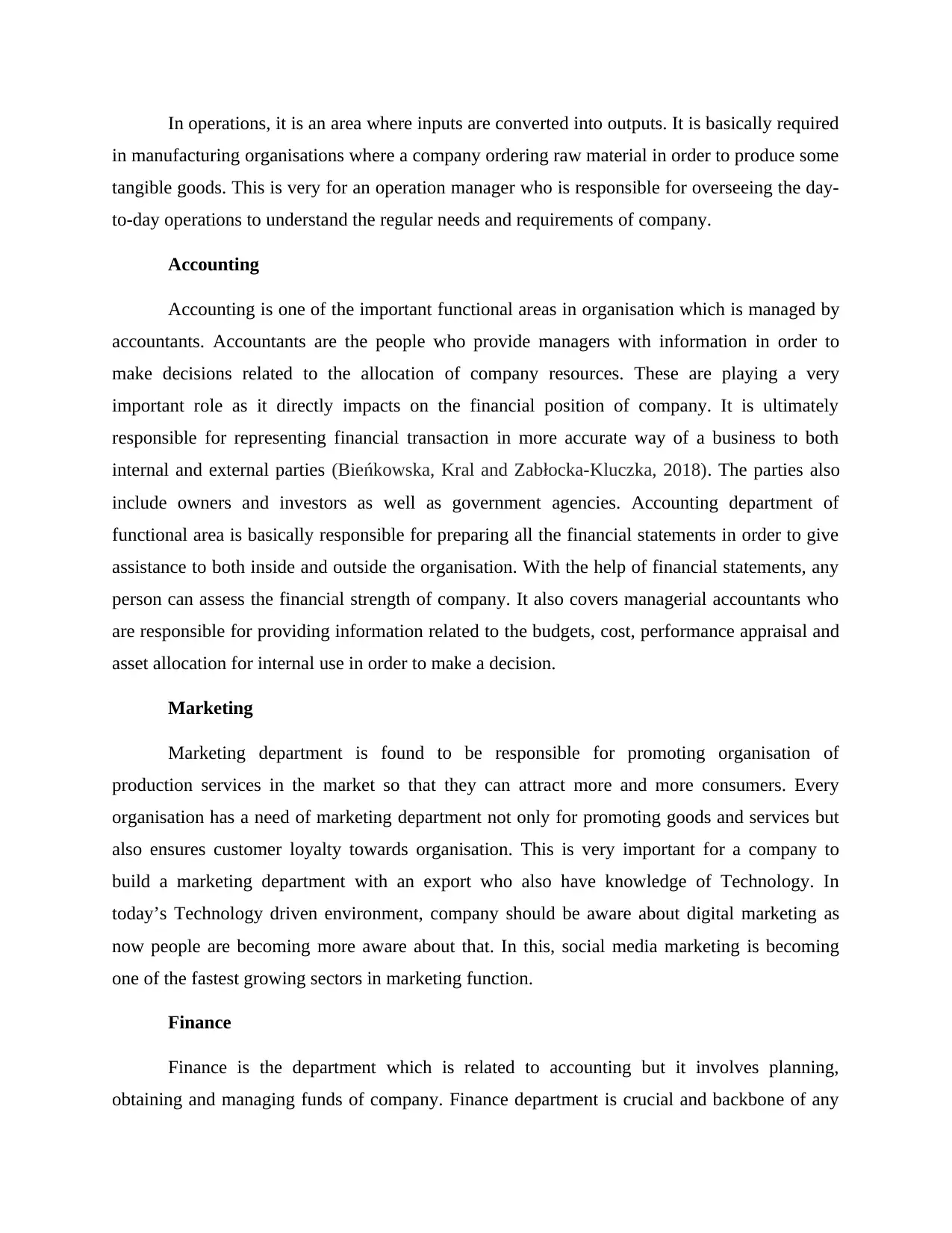
In operations, it is an area where inputs are converted into outputs. It is basically required
in manufacturing organisations where a company ordering raw material in order to produce some
tangible goods. This is very for an operation manager who is responsible for overseeing the day-
to-day operations to understand the regular needs and requirements of company.
Accounting
Accounting is one of the important functional areas in organisation which is managed by
accountants. Accountants are the people who provide managers with information in order to
make decisions related to the allocation of company resources. These are playing a very
important role as it directly impacts on the financial position of company. It is ultimately
responsible for representing financial transaction in more accurate way of a business to both
internal and external parties (Bieńkowska, Kral and Zabłocka-Kluczka, 2018). The parties also
include owners and investors as well as government agencies. Accounting department of
functional area is basically responsible for preparing all the financial statements in order to give
assistance to both inside and outside the organisation. With the help of financial statements, any
person can assess the financial strength of company. It also covers managerial accountants who
are responsible for providing information related to the budgets, cost, performance appraisal and
asset allocation for internal use in order to make a decision.
Marketing
Marketing department is found to be responsible for promoting organisation of
production services in the market so that they can attract more and more consumers. Every
organisation has a need of marketing department not only for promoting goods and services but
also ensures customer loyalty towards organisation. This is very important for a company to
build a marketing department with an export who also have knowledge of Technology. In
today’s Technology driven environment, company should be aware about digital marketing as
now people are becoming more aware about that. In this, social media marketing is becoming
one of the fastest growing sectors in marketing function.
Finance
Finance is the department which is related to accounting but it involves planning,
obtaining and managing funds of company. Finance department is crucial and backbone of any
in manufacturing organisations where a company ordering raw material in order to produce some
tangible goods. This is very for an operation manager who is responsible for overseeing the day-
to-day operations to understand the regular needs and requirements of company.
Accounting
Accounting is one of the important functional areas in organisation which is managed by
accountants. Accountants are the people who provide managers with information in order to
make decisions related to the allocation of company resources. These are playing a very
important role as it directly impacts on the financial position of company. It is ultimately
responsible for representing financial transaction in more accurate way of a business to both
internal and external parties (Bieńkowska, Kral and Zabłocka-Kluczka, 2018). The parties also
include owners and investors as well as government agencies. Accounting department of
functional area is basically responsible for preparing all the financial statements in order to give
assistance to both inside and outside the organisation. With the help of financial statements, any
person can assess the financial strength of company. It also covers managerial accountants who
are responsible for providing information related to the budgets, cost, performance appraisal and
asset allocation for internal use in order to make a decision.
Marketing
Marketing department is found to be responsible for promoting organisation of
production services in the market so that they can attract more and more consumers. Every
organisation has a need of marketing department not only for promoting goods and services but
also ensures customer loyalty towards organisation. This is very important for a company to
build a marketing department with an export who also have knowledge of Technology. In
today’s Technology driven environment, company should be aware about digital marketing as
now people are becoming more aware about that. In this, social media marketing is becoming
one of the fastest growing sectors in marketing function.
Finance
Finance is the department which is related to accounting but it involves planning,
obtaining and managing funds of company. Finance department is crucial and backbone of any
Paraphrase This Document
Need a fresh take? Get an instant paraphrase of this document with our AI Paraphraser
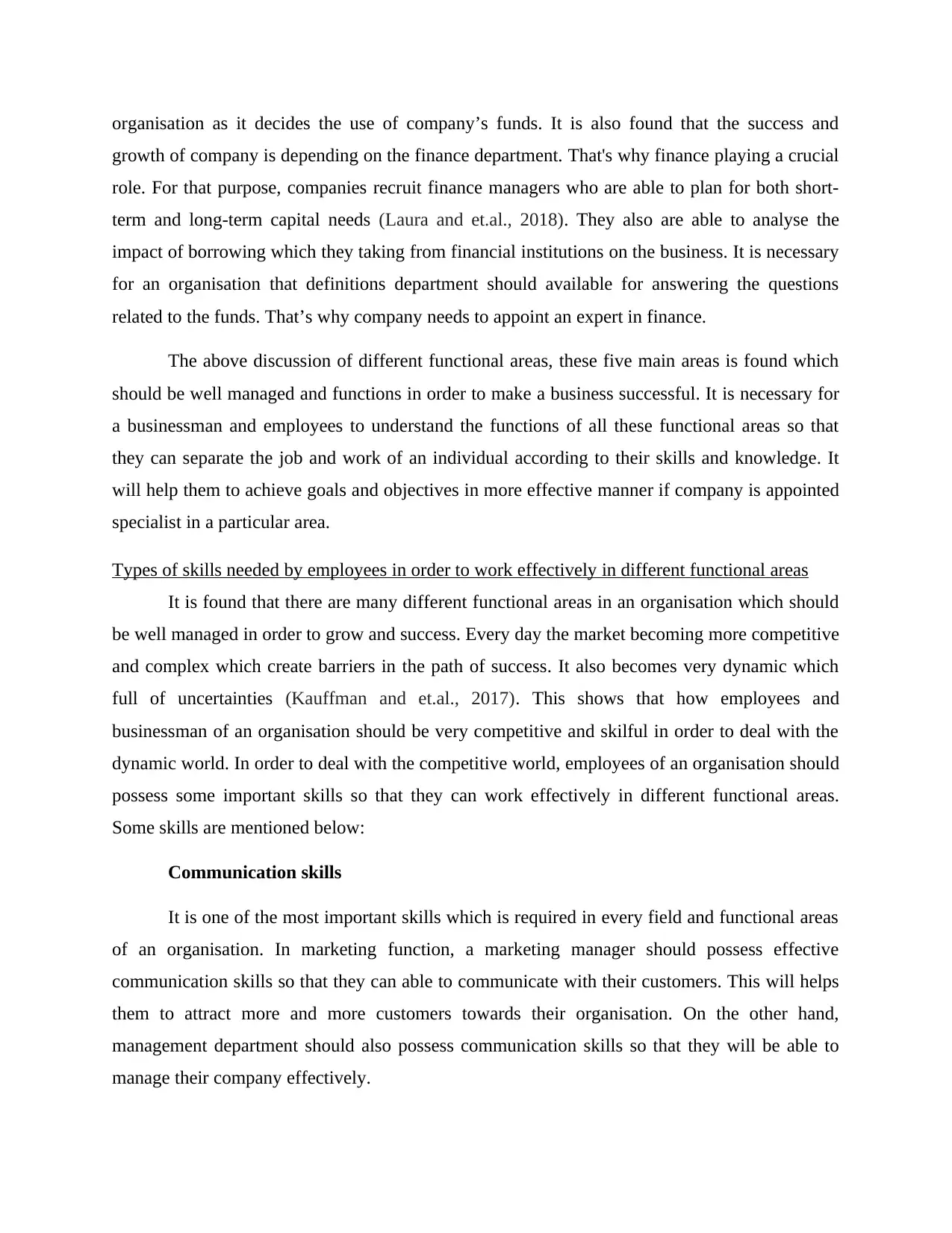
organisation as it decides the use of company’s funds. It is also found that the success and
growth of company is depending on the finance department. That's why finance playing a crucial
role. For that purpose, companies recruit finance managers who are able to plan for both short-
term and long-term capital needs (Laura and et.al., 2018). They also are able to analyse the
impact of borrowing which they taking from financial institutions on the business. It is necessary
for an organisation that definitions department should available for answering the questions
related to the funds. That’s why company needs to appoint an expert in finance.
The above discussion of different functional areas, these five main areas is found which
should be well managed and functions in order to make a business successful. It is necessary for
a businessman and employees to understand the functions of all these functional areas so that
they can separate the job and work of an individual according to their skills and knowledge. It
will help them to achieve goals and objectives in more effective manner if company is appointed
specialist in a particular area.
Types of skills needed by employees in order to work effectively in different functional areas
It is found that there are many different functional areas in an organisation which should
be well managed in order to grow and success. Every day the market becoming more competitive
and complex which create barriers in the path of success. It also becomes very dynamic which
full of uncertainties (Kauffman and et.al., 2017). This shows that how employees and
businessman of an organisation should be very competitive and skilful in order to deal with the
dynamic world. In order to deal with the competitive world, employees of an organisation should
possess some important skills so that they can work effectively in different functional areas.
Some skills are mentioned below:
Communication skills
It is one of the most important skills which is required in every field and functional areas
of an organisation. In marketing function, a marketing manager should possess effective
communication skills so that they can able to communicate with their customers. This will helps
them to attract more and more customers towards their organisation. On the other hand,
management department should also possess communication skills so that they will be able to
manage their company effectively.
growth of company is depending on the finance department. That's why finance playing a crucial
role. For that purpose, companies recruit finance managers who are able to plan for both short-
term and long-term capital needs (Laura and et.al., 2018). They also are able to analyse the
impact of borrowing which they taking from financial institutions on the business. It is necessary
for an organisation that definitions department should available for answering the questions
related to the funds. That’s why company needs to appoint an expert in finance.
The above discussion of different functional areas, these five main areas is found which
should be well managed and functions in order to make a business successful. It is necessary for
a businessman and employees to understand the functions of all these functional areas so that
they can separate the job and work of an individual according to their skills and knowledge. It
will help them to achieve goals and objectives in more effective manner if company is appointed
specialist in a particular area.
Types of skills needed by employees in order to work effectively in different functional areas
It is found that there are many different functional areas in an organisation which should
be well managed in order to grow and success. Every day the market becoming more competitive
and complex which create barriers in the path of success. It also becomes very dynamic which
full of uncertainties (Kauffman and et.al., 2017). This shows that how employees and
businessman of an organisation should be very competitive and skilful in order to deal with the
dynamic world. In order to deal with the competitive world, employees of an organisation should
possess some important skills so that they can work effectively in different functional areas.
Some skills are mentioned below:
Communication skills
It is one of the most important skills which is required in every field and functional areas
of an organisation. In marketing function, a marketing manager should possess effective
communication skills so that they can able to communicate with their customers. This will helps
them to attract more and more customers towards their organisation. On the other hand,
management department should also possess communication skills so that they will be able to
manage their company effectively.
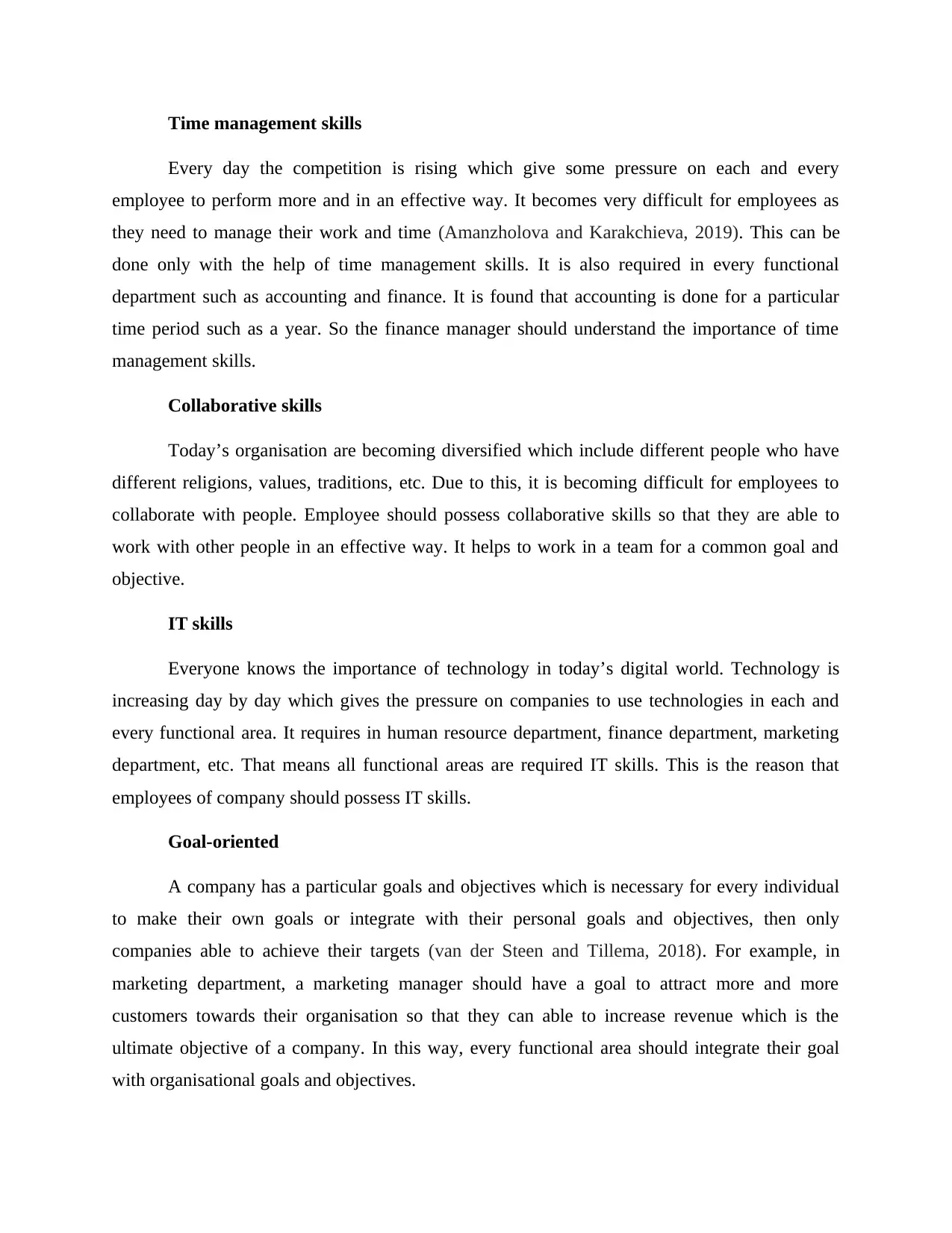
Time management skills
Every day the competition is rising which give some pressure on each and every
employee to perform more and in an effective way. It becomes very difficult for employees as
they need to manage their work and time (Amanzholova and Karakchieva, 2019). This can be
done only with the help of time management skills. It is also required in every functional
department such as accounting and finance. It is found that accounting is done for a particular
time period such as a year. So the finance manager should understand the importance of time
management skills.
Collaborative skills
Today’s organisation are becoming diversified which include different people who have
different religions, values, traditions, etc. Due to this, it is becoming difficult for employees to
collaborate with people. Employee should possess collaborative skills so that they are able to
work with other people in an effective way. It helps to work in a team for a common goal and
objective.
IT skills
Everyone knows the importance of technology in today’s digital world. Technology is
increasing day by day which gives the pressure on companies to use technologies in each and
every functional area. It requires in human resource department, finance department, marketing
department, etc. That means all functional areas are required IT skills. This is the reason that
employees of company should possess IT skills.
Goal-oriented
A company has a particular goals and objectives which is necessary for every individual
to make their own goals or integrate with their personal goals and objectives, then only
companies able to achieve their targets (van der Steen and Tillema, 2018). For example, in
marketing department, a marketing manager should have a goal to attract more and more
customers towards their organisation so that they can able to increase revenue which is the
ultimate objective of a company. In this way, every functional area should integrate their goal
with organisational goals and objectives.
Every day the competition is rising which give some pressure on each and every
employee to perform more and in an effective way. It becomes very difficult for employees as
they need to manage their work and time (Amanzholova and Karakchieva, 2019). This can be
done only with the help of time management skills. It is also required in every functional
department such as accounting and finance. It is found that accounting is done for a particular
time period such as a year. So the finance manager should understand the importance of time
management skills.
Collaborative skills
Today’s organisation are becoming diversified which include different people who have
different religions, values, traditions, etc. Due to this, it is becoming difficult for employees to
collaborate with people. Employee should possess collaborative skills so that they are able to
work with other people in an effective way. It helps to work in a team for a common goal and
objective.
IT skills
Everyone knows the importance of technology in today’s digital world. Technology is
increasing day by day which gives the pressure on companies to use technologies in each and
every functional area. It requires in human resource department, finance department, marketing
department, etc. That means all functional areas are required IT skills. This is the reason that
employees of company should possess IT skills.
Goal-oriented
A company has a particular goals and objectives which is necessary for every individual
to make their own goals or integrate with their personal goals and objectives, then only
companies able to achieve their targets (van der Steen and Tillema, 2018). For example, in
marketing department, a marketing manager should have a goal to attract more and more
customers towards their organisation so that they can able to increase revenue which is the
ultimate objective of a company. In this way, every functional area should integrate their goal
with organisational goals and objectives.
⊘ This is a preview!⊘
Do you want full access?
Subscribe today to unlock all pages.

Trusted by 1+ million students worldwide
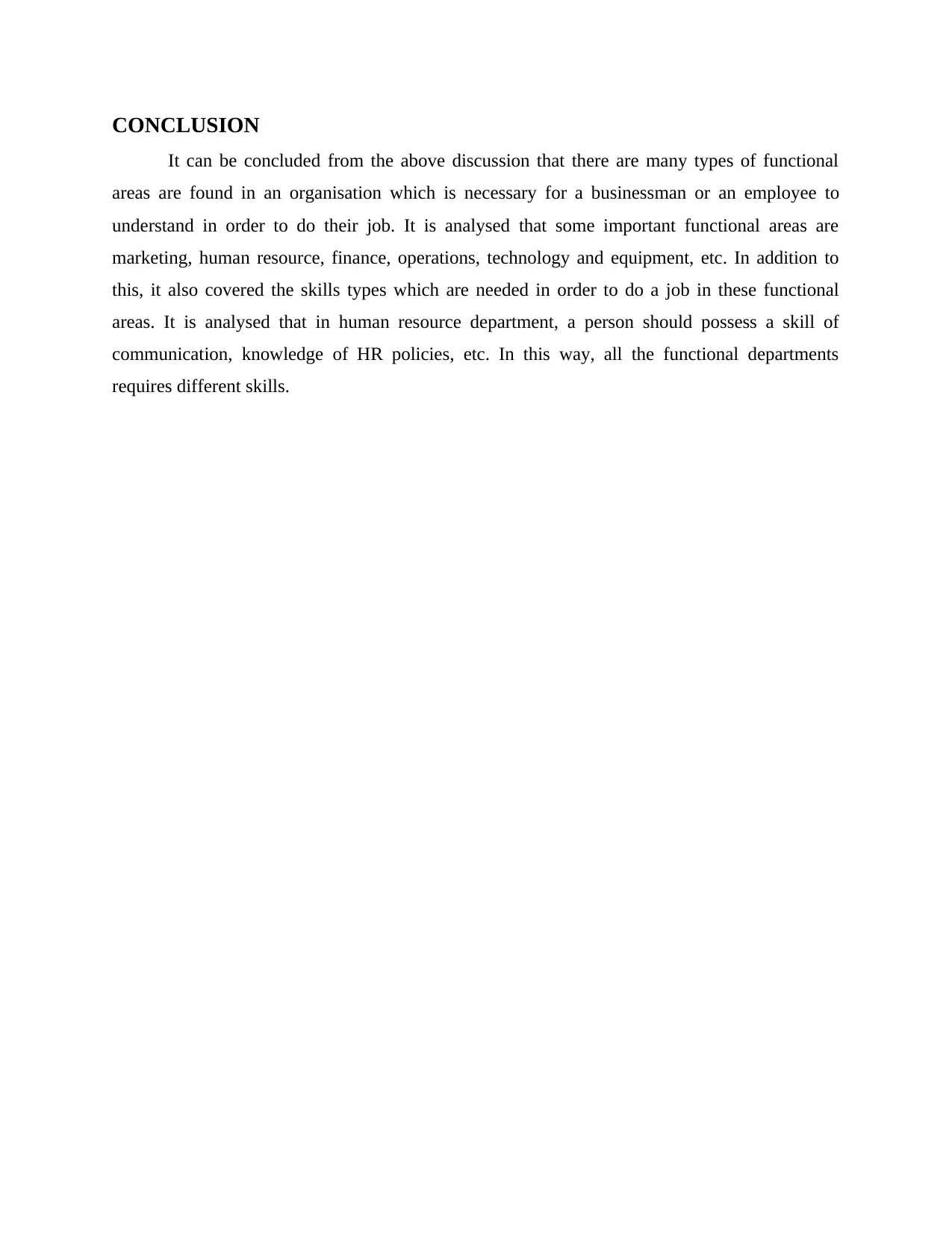
CONCLUSION
It can be concluded from the above discussion that there are many types of functional
areas are found in an organisation which is necessary for a businessman or an employee to
understand in order to do their job. It is analysed that some important functional areas are
marketing, human resource, finance, operations, technology and equipment, etc. In addition to
this, it also covered the skills types which are needed in order to do a job in these functional
areas. It is analysed that in human resource department, a person should possess a skill of
communication, knowledge of HR policies, etc. In this way, all the functional departments
requires different skills.
It can be concluded from the above discussion that there are many types of functional
areas are found in an organisation which is necessary for a businessman or an employee to
understand in order to do their job. It is analysed that some important functional areas are
marketing, human resource, finance, operations, technology and equipment, etc. In addition to
this, it also covered the skills types which are needed in order to do a job in these functional
areas. It is analysed that in human resource department, a person should possess a skill of
communication, knowledge of HR policies, etc. In this way, all the functional departments
requires different skills.
Paraphrase This Document
Need a fresh take? Get an instant paraphrase of this document with our AI Paraphraser
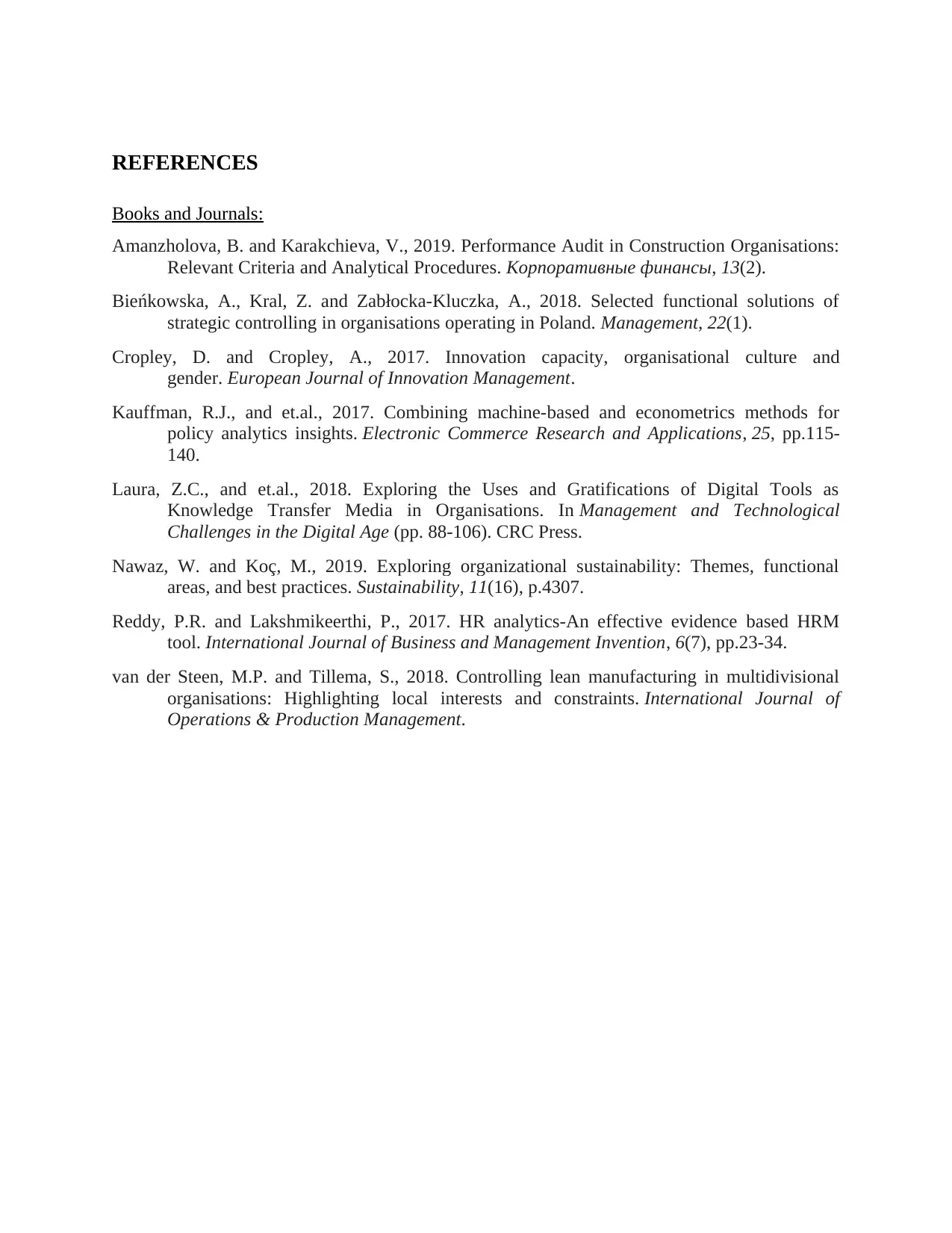
REFERENCES
Books and Journals:
Amanzholova, B. and Karakchieva, V., 2019. Performance Audit in Construction Organisations:
Relevant Criteria and Analytical Procedures. Корпоративные финансы, 13(2).
Bieńkowska, A., Kral, Z. and Zabłocka-Kluczka, A., 2018. Selected functional solutions of
strategic controlling in organisations operating in Poland. Management, 22(1).
Cropley, D. and Cropley, A., 2017. Innovation capacity, organisational culture and
gender. European Journal of Innovation Management.
Kauffman, R.J., and et.al., 2017. Combining machine-based and econometrics methods for
policy analytics insights. Electronic Commerce Research and Applications, 25, pp.115-
140.
Laura, Z.C., and et.al., 2018. Exploring the Uses and Gratifications of Digital Tools as
Knowledge Transfer Media in Organisations. In Management and Technological
Challenges in the Digital Age (pp. 88-106). CRC Press.
Nawaz, W. and Koç, M., 2019. Exploring organizational sustainability: Themes, functional
areas, and best practices. Sustainability, 11(16), p.4307.
Reddy, P.R. and Lakshmikeerthi, P., 2017. HR analytics-An effective evidence based HRM
tool. International Journal of Business and Management Invention, 6(7), pp.23-34.
van der Steen, M.P. and Tillema, S., 2018. Controlling lean manufacturing in multidivisional
organisations: Highlighting local interests and constraints. International Journal of
Operations & Production Management.
Books and Journals:
Amanzholova, B. and Karakchieva, V., 2019. Performance Audit in Construction Organisations:
Relevant Criteria and Analytical Procedures. Корпоративные финансы, 13(2).
Bieńkowska, A., Kral, Z. and Zabłocka-Kluczka, A., 2018. Selected functional solutions of
strategic controlling in organisations operating in Poland. Management, 22(1).
Cropley, D. and Cropley, A., 2017. Innovation capacity, organisational culture and
gender. European Journal of Innovation Management.
Kauffman, R.J., and et.al., 2017. Combining machine-based and econometrics methods for
policy analytics insights. Electronic Commerce Research and Applications, 25, pp.115-
140.
Laura, Z.C., and et.al., 2018. Exploring the Uses and Gratifications of Digital Tools as
Knowledge Transfer Media in Organisations. In Management and Technological
Challenges in the Digital Age (pp. 88-106). CRC Press.
Nawaz, W. and Koç, M., 2019. Exploring organizational sustainability: Themes, functional
areas, and best practices. Sustainability, 11(16), p.4307.
Reddy, P.R. and Lakshmikeerthi, P., 2017. HR analytics-An effective evidence based HRM
tool. International Journal of Business and Management Invention, 6(7), pp.23-34.
van der Steen, M.P. and Tillema, S., 2018. Controlling lean manufacturing in multidivisional
organisations: Highlighting local interests and constraints. International Journal of
Operations & Production Management.
1 out of 8
Related Documents
Your All-in-One AI-Powered Toolkit for Academic Success.
+13062052269
info@desklib.com
Available 24*7 on WhatsApp / Email
![[object Object]](/_next/static/media/star-bottom.7253800d.svg)
Unlock your academic potential
Copyright © 2020–2025 A2Z Services. All Rights Reserved. Developed and managed by ZUCOL.




